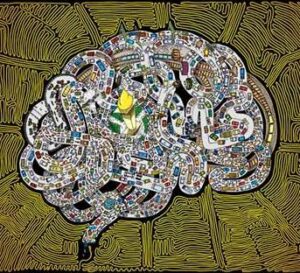There are a set of shared experiences among the parents of children with Sensory Processing Disorder and there is comfort in knowing that you are not alone. As a parent of two and a psychologist who works with parents and children, I understand the unique set of challenges faced by families raising highly sensitive children.

The sensitive child is like a unique and multifaceted gem. This child shines brilliantly sometimes allowing you to see into the depth and clarity at the center, and at times reflecting you so intensely that you are called to see yourself in challenging and uncomfortable ways. At times, these children can project diamond quality strength. Other times, the intensity which with they feel the world can result in meltdowns and tantrums and we must help them through these scattered and intensely challenging moments. That is if we haven’t melted down right along with them! Helping the sensitive child make sense of their inner and outer world can take parents to and beyond their limits.

There are a set of shared experiences among the parents of sensitive children and there is comfort in knowing that you are not alone in the challenges you are facing. Here is what parents of sensitive children often say:

Once I understood Sensory Processing Disorder I finally had the information I needed to stop blaming myself or feeling as though I was crazy! My child was having a neurological “traffic jam” that was the invisible culprit behind her behavioral breakdowns and anxious approach to the world.
Technically, Sensory Processing Disorder and Highly Sensitive Children are two different but related conditions. Sensory Processing Disorder was first identified by A. Jean Ayres an occupational therapist who identified that some children over- or under-respond in one or multiple senses (e.g. tactile sensitivity, sound sensitivity, light sensitivity). The highly sensitive child is a related concept developed by Elaine Aron who describes these children as easily overwhelmed by high levels of stimulation, sudden changes, and the emotional distress of others.The sensory challenges shared by parents and children I work with include:
 Become your child’s emotional coach. Help older children talk about their feelings and reflect on what they are experiencing. Validate, reflect, and help them develop problem solving skills.
Become your child’s emotional coach. Help older children talk about their feelings and reflect on what they are experiencing. Validate, reflect, and help them develop problem solving skills.Further reading:

Arielle Schwartz, PhD, is a psychologist, internationally sought-out teacher, yoga instructor, and leading voice in the healing of PTSD and complex trauma. She is the author of five books, including The Complex PTSD Workbook, EMDR Therapy and Somatic Psychology, and The Post Traumatic Growth Guidebook.
Dr. Schwartz is an accomplished teacher who guides therapists in the application of EMDR, somatic psychology, parts work therapy, and mindfulness-based interventions for the treatment of trauma and complex PTSD. She guides you through a personal journey of healing in her Sounds True audio program, Trauma Recovery.
She has a depth of understanding, passion, kindness, compassion, joy, and a succinct way of speaking about very complex topics. She is the founder of the Center for Resilience Informed Therapy in Boulder, Colorado where she maintains a private practice providing psychotherapy, supervision, and consultation. Dr. Schwartz believes that that the journey of trauma recovery is an awakening of the spiritual heart.